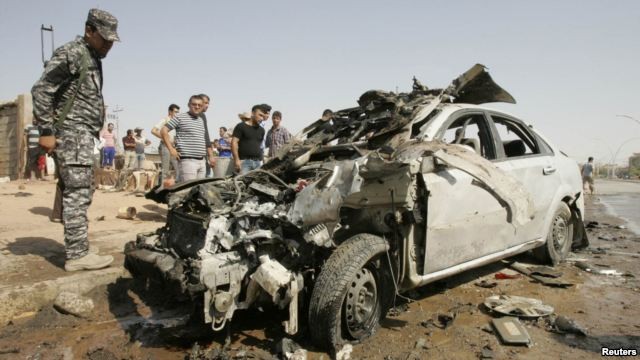 |
| Iraqi police are on the scene following a bomb attack in Kirkuk, north of Baghdad, on July 23rd, 2012 |
(VOVworld) – Although half a year has gone since American forces lowered its flag in Baghdad last December marking 9 years of its operations in Iraq, the country’s security remains a big question. The international community is worried about an upsurge in the struggle for power there when the US withdraws its troops or the reoccurrence of terrorism attacks due to recent events in Iraq. VOV editor Anh Huyen gives you more details.
This Monday, Iraq was struck by a wave of bomb attacks claiming the lives of 91 people and injuring 161 others, becoming the bloodiest day the country has experienced in more than two years. The worst violence took place in the town of Taji, only 25 kilometers north of Baghdad. A series of explosions there killed at least 18 and wounded 29. Near the town of Dhuluiyah in Salahudin Province, 80 km north of the capital, unidentified armed men broke into a military base killing 15 soldiers and 2 members of pro-Government group of Sahwa. Another team of assailants attacked a checkpoint controlled by the Sahwa pro-government group at the outskirts of Samarra, 110 km north of Baghdad killing 2 soldiers and wounding 3 others. A series of bomb blasts and shootings occurred right in Baghdad and many other northern provinces including Saadiyah, Khan Beni Saad, Kirkuk, Tuz Khurmatu and Dibis. These attacks claimed the lives of 45 people and left at least 74 others wounded. There was no immediate claim of responsibility for yesterday’s attacks but Al-Qeada’s front group in Iraq has warned in recent days that it seeks to reclaim territory in the country.
Iraq’s recent reality is one of being assailed by bomb attacks and bloody clashes. During the time the US military forces were stationing there, many attacks had taken place. As soon as the last US soldier leaves the country, attacks have occurred continuously and forcefully. Last Sunday, three consecutive car bombs were conducted in Mahmudiya Town, 30 km south of Baghdad - 11 died and 38 others were wounded. Statistics show that last month bomb attacks claimed 237 lives making June one of the bloodiest months in Iraq since the US troops withdrew. On its website, ‘the Islamic State of Iraq’, a branch of al-Qeada terrorists admitted to organizing 40 of the bloodiest attacks in the country targeting Shiite Muslim pilgrims and the Iraqi security force.
Despite efforts by the Iraqi Government and security forces to maintain order, violence has relentlessly increased. This has stirred up doubts on the capacity of the Baghdad administration to govern the country. But international observers say that contradiction and internal division make it hard for the country’s leaders to find a common voice for governing the country. Post-US troop withdrawal encouraged the division of Iraq into three – Kurds control the northern provinces which are rich in oil and petrol; the Christians and Sunni Muslims are in charge of central provinces, and oil-rich southern provinces belong to the Shiite Muslims.
Recently, the four central provinces of Salah al-din, Diyala, Anbar and Nineveh had called for establishing an independent country of Sunni Muslims who say the central government led by the Shiite has not paid attention to their interests and treat them as the second-class citizens.
Last month, the Iraqi Higher Criminal Court resumed the trial of vice-president Tariq al-Hashimi, a senior politician of the Sunni Iraqiya bloc in the Iraqi Parliament for charges connected with "terrorism". The resumption of the trial reflects a serious contradiction within the country’s administration. Late last year, the Iraqi Supreme Judge Council issued a warrant to arrest Tareq al-Hashemi and this generated varied reactions within the government. As before the move, the Sunni faction boycotted the Parliament objecting to Prime Minister Nuri al-Maliki’s delay in dealing with political deadlocks, causing the establishment of a power-splitting government amongst Sunni, Shiite, and Kurd communities.
Anh Huyen